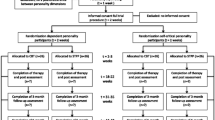Abstract
This review sought to outline the common complicating and facilitating factors during treatment of depressive symptoms in patients with narcissistic pathology, including various specific treatment approaches. A systematic literature search was performed to identify literature describing the co-occurrence of depressive symptoms and narcissistic pathology along with psychotherapeutic considerations and methods used to treat depressive symptoms in such patients. Theory and research suggest that depressive symptoms often co-occur with narcissistic disturbances because depression may emerge when narcissistic defenses fail. Narcissistic disturbances are thought to oscillate between grandiose and vulnerable features, and patients often seek treatment when they are in the vulnerable state. Psychological factors that are frequently dysregulated in these patients are shame, perfectionism and aggression. These factors must therefore be recognized as a part of the narcissistic pathology, and should particularly be considered in order to build a psychotherapeutic alliance with the patient, to avoid premature termination of treatment, and to achieve a positive treatment response. Psychotherapy must primarily target the underlying narcissistic disturbance, and not the depressive symptoms per se. The review aims at outlining treatment approaches that may be useful for clinicians.
Similar content being viewed by others
References
Almond, R. (2004). ”I can do it (all) myself”: Clinical technique with defensive narcissistic self-sufficiency. Psychoanalytic Psychology,21(3), 371–384.
Anastasopoulos, D. (1997). Shame in psychotherapy with adolescents. Journal of Child Psychotherapy,23(1), 103–123.
Anastasopoulos, D. (2007). The narcissism of depression or the depression of narcissism and adolescence. Journal of Child Psychotherapy,33(3), 345–362.
Battegay, R. (1977). The different kinds of group psychotherapy with patients with different diagnoses. Acta Psychiatrica Scandinavica,55, 345–354.
Battegay, R. (1985). The different narcissistic disturbances of personality and their psychotherapeutic approach. Psychotherapy and Psychosomatics,44(1), 46–53.
Battegay, R. (1989). Group psychotherapy with depressives. Group Analysis,22(1), 31–38.
Bleichmar, H. B. (1996). Some subtypes of depression and their implications for psychoanalytic treatment. International Journal of Psycho-Analysis,77, 935–961.
Broucek, F. (1982). Shame and its relationship to early narcissistic development. International Journal of Psycho-Analysis,63, 369–378.
Diamond, D., & Meehan, K. B. (2013). Attachment and object relations in patients with narcissistic personality disorder: Implications for therapeutic process and outcome. Journal of Clinical Psychology,69(11), 1148–1159.
Dimaggio, G., & Attina, G. (2012). Metacognitive interpersonal therapy for narcissistic personality disorder and associated perfectionism. Journal of Clinical Psychology,68(8), 922–934.
Dimaggio, G., Fiore, D., Lysaker, P. H., Petrilli, D., Salvatore, G., Semerari, A., et al. (2006). Early narcissistic transference patterns: An exploratory single case study from the perspective of dialogical self theory. Psychology and Psychotherapy: Theory, Research and Practice,79(4), 495–516. https://doi.org/10.1348/147608305X63089.
Dimaggio, G., Nicolò, G., Fiore, D., Centenero, E., Semerari, A., Carcione, A., et al. (2008). States of minds in narcissistic personality disorder: Three psychotherapies analyzed using the grid of problematic states. Psychotherapy Research,18(4), 466–480. https://doi.org/10.1080/10503300701881877.
Erkoreka, L., & Navarro, B. (2017). Vulnerable narcissism is associated with severity of depressive symptoms in dysthymic patients. Psychiatry Research,257, 265–269.
Gabbard, G. O. (1989). Two subtypes of narcissistic personality disorder. Bulletin of the Menninger Clinic,53(6), 527–532.
Gabbard, G. O. (2009). Transference and countertransference: Developments in treatment of narcissistic personality disorder. Psychiatric Annals,39(3), 129–136.
Kealy, D., Tsai, M., & Ogrodniczuk, J. S. (2012). Depressive tendencies and pathological narcissism among psychiatric outpatients. Psychiatry Research,196, 157–159.
Kernberg, O. F. (2009). Narcissistic personality disorders: Part 1. Psychiatric Annals,39, 105–167.
Kernberg, O. F., Yeomans, F. E., Clarkin, J. F., & Levy, K. N. (2008). Transference focused psychotherapy: Overview and update. International Journal of Psychoanalysis,89, 601–620.
Kitron, D. G. (1994). Depression and grandiosity: Clinical and theoretical Issues in the treatment of narcissistic disturbances. Journal of Contemporary Psychotherapy,24, 3.
Marčinko, D., Jakšić, N., Ivezić, E., Skočić, M., Surányi, Z., Lončar, M., et al. (2014). Pathological narcissism and depressive symptoms in psychiatric outpatients: Mediating role of dysfunctional attitudes. Journal of Clinical Psychology,70(4), 341–352.
Miller, J. D., Gentile, B., Wilson, L., & Campbell, W. K. (2012). Grandiose and vulnerable narcissism and the dsm-5 pathological personality trait model. Journal of Personality Assessment,95(3), 284–290.
Ornstein, A. (1998). The fate of narcissistic rage in psychotherapy. Psychoanalytic Inquiry,18(1), 55–70.
Pincus, A. L., Cain, N. M., & Wright, A. G. C. (2014). Narcissistic grandiosity and narcissistic vulnerability in psychotherapy. Personality Disorders: Theory, Research, and Treatment,5(4), 439–443.
Ronningstam, E. (2011). Narcissistic personality disorder: A clinical perspective. Journal of Psychiatric Practice,17(2), 89–99.
Ronningstam, E. (2012). Alliance building and narcissistic personality disorder. Journal of Clinical Psychology,68(8), 943–953.
Seavey, A., & Moore, T. M. (2012). Schema-focused therapy for major depressive disorder and personality disorder: A case study. Clinical Case Studies,11(6), 457–473.
Tritt, S. M., Ryder, A. G., Ring, A. J., & Pincus, A. L. (2010). Pathological narcissism and the depressive temperament. Journal of Affective Disorders,122, 280–284.
Weiner, M. B., & White, M. T. (1982). Depression as the search for the lost self. Psychotherapy: Theory, Research and Practice,19(4), 491–499.
Yang, P. S., & Huang, T. L. (2004). Pessimistic mood in decompensated narcissistic patient. Chang Gung Medical Journal,27, 318–321.
Acknowledgement
The study was partially made possible by funding granted to the first author from the Health Scientific Research Fund of Region Zealand.
Author information
Authors and Affiliations
Corresponding author
Ethics declarations
Conflict of interest
The authors do not have any commercial association that might pose a conflict of interest in connection with the study.
Additional information
Publisher's Note
Springer Nature remains neutral with regard to jurisdictional claims in published maps and institutional affiliations.
Rights and permissions
About this article
Cite this article
Fjermestad-Noll, J., Ronningstam, E., Bach, B. et al. Psychotherapeutic Treatment of Depressive Symptoms in Patients with Narcissistic Disturbances: A Review. J Contemp Psychother 50, 21–28 (2020). https://doi.org/10.1007/s10879-019-09437-4
Published:
Issue Date:
DOI: https://doi.org/10.1007/s10879-019-09437-4




